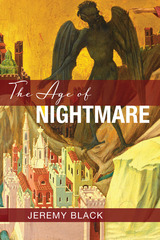4 books about Della Seta, Fabrizio
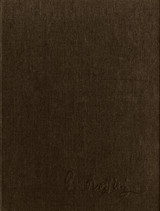
Adina
Farsa in One Act by Gherardo Bevilacqua Aldobrandini
Gioachino Rossini
University of Chicago Press, 2001
Among Rossini's operas Adina has perhaps the most mysterious origins. Commissioned by an unknown Portuguese admirer as a gift for an unknown soprano, composed in 1818 yet not performed until 1826, the opera develops the popular theme of the "abduction from the serraglio." Rossini, pressed by the contract to complete the work quickly, composed anew only four of the work's nine numbers: the Introduction, the disarming Cavatina Adina "Fragolette fortunate" (Lucky little strawberries), the Quartet, and the Finale; for three others he turned to his own Sigismondo of 1814; the remaining two were written by a collaborator.
The critical edition, the first publication in full score, draws on the autograph of Sigismondo and Rossini's drafts for setting the new texts as well as the autograph of Adina. In his preface discussing Adina's uncertain genesis and successive history, Fabrizio Della Seta examines the documents extant in Portugal and Italy and considers hypotheses about the identity of the commissioner, the dedicatee, and the collaborator.
The critical edition, the first publication in full score, draws on the autograph of Sigismondo and Rossini's drafts for setting the new texts as well as the autograph of Adina. In his preface discussing Adina's uncertain genesis and successive history, Fabrizio Della Seta examines the documents extant in Portugal and Italy and considers hypotheses about the identity of the commissioner, the dedicatee, and the collaborator.
[more]
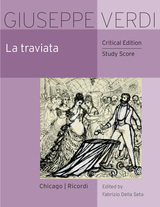
La traviata
Critical Edition Study Score
Giuseppe Verdi
University of Chicago Press, 2017
“I complain bitterly of the editions of my last operas, made with such little care, and filled with an infinite number of errors.”—Giuseppe Verdi
The University of Chicago Press, in collaboration with Casa Ricordi, has undertaken to publish the first critical edition of the complete works of Giuseppe Verdi. The series, based exclusively on original sources, is the only one to present authentic versions of all of the composer’s works; together with his operas, the critical edition presents his songs, his choral music and sacred pieces, and his string quartet and other instrumental works.
The Works of Giuseppe Verdi will be an invaluable standard reference work—a necessary acquisition for all music libraries and a joy to own for all lovers of opera. The new series of study scores presents an adaptation of each critical edition that provides scholars with an affordable and portable option for exploring Verdi’s oeuvre. The study scores have been designed to distinguish editors’ marks from Verdi’s own notations while remaining clear enough for use in performance. The introduction to each score discusses the work’s sources, composition, and performance history, as well as performance practices, instrumentation, and problems of notation. The newest editions of the study scores examine two of Verdi’s three-act operas: La traviata and Rigoletto.
The University of Chicago Press, in collaboration with Casa Ricordi, has undertaken to publish the first critical edition of the complete works of Giuseppe Verdi. The series, based exclusively on original sources, is the only one to present authentic versions of all of the composer’s works; together with his operas, the critical edition presents his songs, his choral music and sacred pieces, and his string quartet and other instrumental works.
The Works of Giuseppe Verdi will be an invaluable standard reference work—a necessary acquisition for all music libraries and a joy to own for all lovers of opera. The new series of study scores presents an adaptation of each critical edition that provides scholars with an affordable and portable option for exploring Verdi’s oeuvre. The study scores have been designed to distinguish editors’ marks from Verdi’s own notations while remaining clear enough for use in performance. The introduction to each score discusses the work’s sources, composition, and performance history, as well as performance practices, instrumentation, and problems of notation. The newest editions of the study scores examine two of Verdi’s three-act operas: La traviata and Rigoletto.
[more]
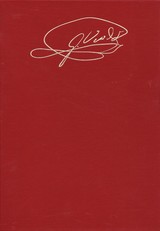
La traviata
Melodramma in Three Acts, Libretto by Francesco Maria Piave
Giuseppe Verdi
University of Chicago Press, 1997
Now one of Verdi's most beloved works, La traviata was initially far from a success. Verdi declared its 1853 premiere a "fiasco," and later reworked parts of five pieces in the first two acts, retaining the original setting for the rest. The first performance of the new version in 1854 was a tremendous success, and the opera was quickly taken up by theaters around the world.
This critical edition presents the 1854 version as the main score, and also makes available for the first time in full score the original 1853 settings of the revised pieces. For this edition Fabrizio della Seta used not only the composer's autograph and many secondary sources, but also Verdi's previously unknown sketches. These sketches helped corroborate the original readings and illuminate the work's compositional stages. The editor's wide-ranging introduction traces the opera's genesis, sources, performance history and practices, and a detailed critical commentary discusses source problems and ambiguities.
This critical edition presents the 1854 version as the main score, and also makes available for the first time in full score the original 1853 settings of the revised pieces. For this edition Fabrizio della Seta used not only the composer's autograph and many secondary sources, but also Verdi's previously unknown sketches. These sketches helped corroborate the original readings and illuminate the work's compositional stages. The editor's wide-ranging introduction traces the opera's genesis, sources, performance history and practices, and a detailed critical commentary discusses source problems and ambiguities.
[more]
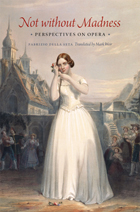
Not without Madness
Perspectives on Opera
Fabrizio Della Seta
University of Chicago Press, 2012
Opera often seems to arouse either irrational enthusiasm or visceral dislike. Such madness, as Goethe wrote, is indispensable in all theater, and yet in practice, sentiment and passion must be balanced by sense and reason. Exploring this tension between madness and reason, Not without Madness presents new analytical approaches to thinking about eighteenth- and nineteenth-century opera through the lenses of its historical and cultural contexts.
In these twelve essays, Fabrizio Della Seta explores the concept of opera as a dramatic event and an essential moment in the history of theater. Examining the meaning of opera and the devices that produce and transmit this meaning, he looks at the complex verbal, musical, and scenic mechanisms in parts of La sonnambula, Ernani, Aida, Le nozze di Figaro, Macbeth, and Il trovatore. He argues that approaches to the study of opera must address performance, interpretation, composition, reception, and cultural ramifications. Purely musical analysis does not make sense unless we take into account music’s dramatic function. Containing many essays available for the first time in English, Not without Madness bridges recent divisions in opera studies and will attract musicologists, musicians, and opera lovers alike.
[more]
READERS
Browse our collection.
PUBLISHERS
See BiblioVault's publisher services.
STUDENT SERVICES
Files for college accessibility offices.
UChicago Accessibility Resources
home | accessibility | search | about | contact us
BiblioVault ® 2001 - 2024
The University of Chicago Press


